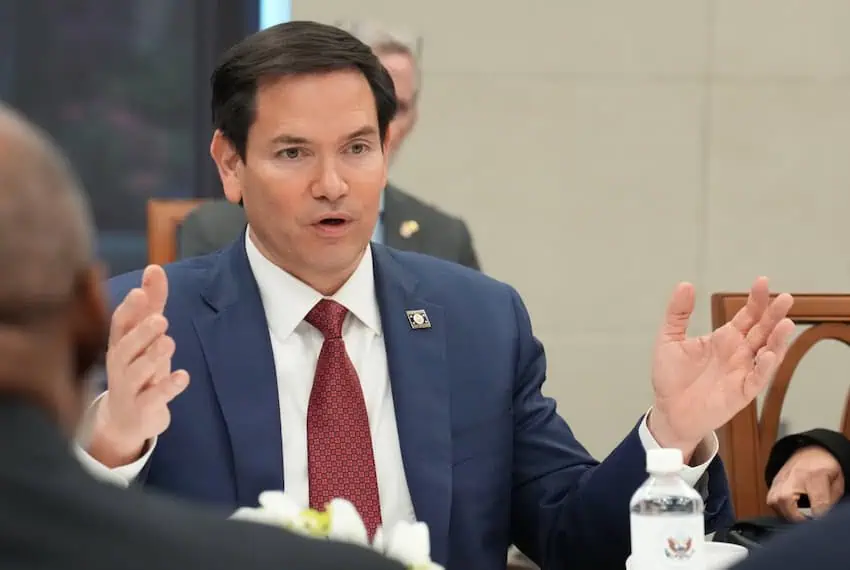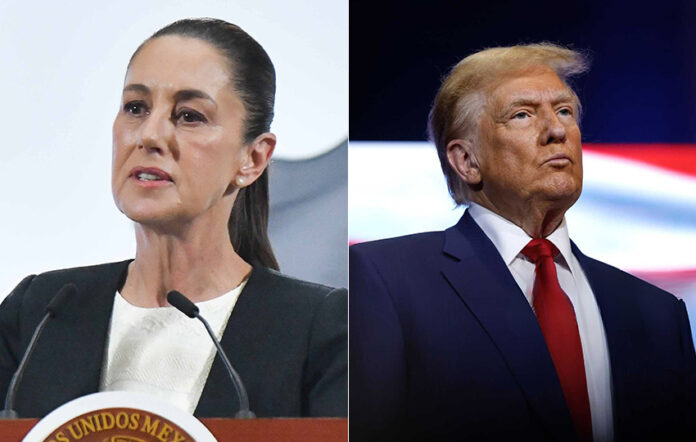President Claudia Sheinbaum on Friday told reporters that an executive order signed by U.S. President Donald Trump directing the Pentagon to target foreign drug cartels does not pose a risk of invasion to Mexico.
Citing anonymous sources, a New York Times report published on Friday said that Trump has “secretly signed a directive to the Pentagon to begin using military force against certain Latin American drug cartels that his administration has deemed terrorist organizations.”
During her daily press conference, Sheinbaum said the directive does not imply that the U.S. military will cross the border into Mexico. She also told reporters that her administration had been advised of the details of the executive order.
“We were informed that this executive order was coming and that it had nothing to do with the participation of any military personnel or any institution in our territory,” she said, adding that the directive referred exclusively to actions within U.S. territory.
When asked about the Times’ reporting that the directive authorized military use abroad, on land and sea, Sheinbaum dismissed that claim, too.
“No,” she said, “absolutely not. The United States is not going to send its military into Mexico. We cooperate, we collaborate, but there will be no invasion. That’s ruled out … because, in addition to what we’ve stated in all our conversations, it’s not allowed, nor is it part of any agreement.

“Each time they’ve raised the issue, we’ve said no. We can collaborate in other ways, but if [entry of the U.S. military is the suggestion], then no.”
When pressed to explain if the reporting was inaccurate, Sheinbaum demurred, suggesting she had not seen the directive.
“Well, we’ll have to see how the executive order is [written],” she said, “but there’s no risk that they’ll invade our territory.”
The Times reported the U.S. Defense Department declined to comment on the directive. When AFP contacted the Pentagon with regard to the executive order, its questions were referred to the White House.
Still, the Times said Trump’s directive provides an official basis for U.S. military operations at sea or on foreign soil against the cartels.
Mexican cartels in the crosshairs
In February, the Trump administration designated six Mexican drug trafficking groups as terrorist organizations. When the U.S. government announced this classification, Sheinbaum warned that her administration would never tolerate a U.S. invasion.
In a Thursday television interview, U.S. Secretary of State Marco Rubio said the U.S. government could use the designations to “target” cartels, without further specifying what range of actions could be used to do so.

“It allows us to now target what they’re operating and to use other elements of American power, intelligence agencies, the Department of Defense … to target these groups if we have an opportunity to do it,” Rubio said. “We have to start treating them as armed terrorist organizations, not simply drug dealing organizations.”
The Trump administration has already deployed thousands of active-duty combat troops to the U.S. border with Mexico in order to staunch the northward flow of drugs, particularly fentanyl, as well as limit the flow of immigrants.
The U.S. also has sent two warships to patrol the coasts of Mexico — one in the Pacific Ocean, the other in the Gulf of Mexico — a use of naval force without precedent in U.S. border security operations.
The U.S. has also been using drones and spy planes to surveil Mexican drug cartels, an action that Sheinbaum said was “part of a coordinated operation between the U.S. and Mexican governments.”
At the same time, the news agency Reuters reported on Friday that the U.S. Federal Bureau of Investigation (FBI) is looking to add drug cartel suspects to its terror watch list.
In an exclusive report filed after reviewing law enforcement documents, Reuters reported that the FBI has asked local police to submit the names of people they believe are linked to the eight criminal groups designated as terrorist organizations in February. It also asked for information about family members and associates of the groups’ members.
These names would be added to the U.S. government’s terrorist watch list which contained roughly 1.1 million names as of a year ago.
Civil rights groups have complained that designating suspected cartel and gang members, as well as their relatives, as terrorists will drastically expand the number of people on the watch list, which can subject people to surveillance on airplanes, travel restrictions and secondary screenings at airports and other ports of entry into the United States.
With reports from The New York Times, El Universal, Reforma, Reuters and CBS News
